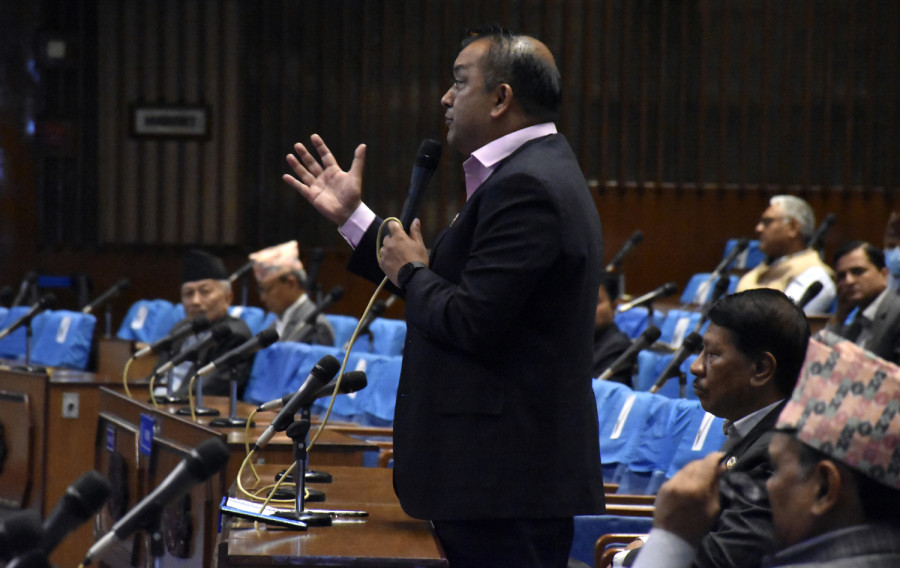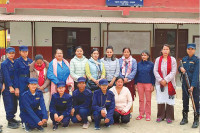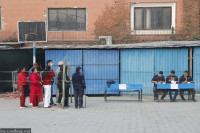National
Congress’ Thapa and UML’s Gyawali demand clarification from Deuba on SPP
The US State Partnership Program takes the centre stage in Parliament on Wednesday with calls growing for the government to come clean.
Post Report
Nepali Congress General Secretary Gagan Thapa on Wednesday demanded that Prime Minister Sher Bahadur Deuba apprise the Parliament about the much talked about State Partnership Program of the United States, which has triggered a new debate in Nepal leaving the political and intellectual circles divided.
Speaking at Wednesday’s meeting of the House, Thapa said the prime minister must clarify that Nepal is not going to sign the SPP.
“The incumbent prime minister is also the president of my party. Nepal was never in favour of such a strategic interest [of any country]. Nor is it now. So I understand the prime minister also has the same opinion,” said Thapa. “I would like to request him to present his clear views today. What the US wants is up to it. What we should do… the prime minister should let us know.”
When it comes to strategic issues, Nepal must tread carefully, he said.
“When there are strategic interests, we should start away from powerful countries. This is not just my opinion; our constitution also says the same,” he added. “My party, the Nepali Congress, also has the same views.”
Earlier on Wednesday, the main opposition CPN-UML warned the government not to push the country into any geopolitical conflict by signing the SPP.
“Signing the SPP will push the country into a geopolitical conflict… it is unacceptable,” said UML leader and former foreign minister Pradeep Gyawali.
Gyawali also demanded clarification from the government.
“The draft proposal of the SPP has raised serious concerns,” he said. “Nepal’s foreign policy will be breached if it decides to be part of any military alliance.”
Stating that the proposal for signing the SPP was made during the KP Sharma Oli government, he said but it was kept on hold for studying.
He was the foreign minister then.
The SPP issue has surfaced just ahead of the visits of Prime Minister Sher Bahadur Deuba and Chief of Army Staff General Prabhu Ram Sharma to the United States.
Gen Sharma is scheduled to visit the US at the invitation of the Pentagon from June 27 to July 1 while Prime Minister Deuba is visiting Washington in mid July, of which a formal announcement is yet to be made.
Nepal’s participation in the State Partnership Program (SPP) got a renewed push last week during the visit of Commanding General of the US Army Pacific Charles Flynn to Nepal.
During his meetings with Prime Minister Deuba and Gen Sharma, Flynn called for signing the SPP.
The first report on Indo-Pacific Strategy released in 2019 by the Pentagon had mentioned that Nepal and Sri Lanka were recent entrants to the State Partnership Program but the next report released in 2021 is silent on Nepal’s participation in the State Partnership Program and the Indo-Pacific Strategy.
The US first came up with the concept of the SPP in 1993 as a humanitarian and disaster response training programme.
When Nepal first requested the US government to become part of the SPP in 2015, Rajendra Chettri was the Nepal Army chief.
After the parliamentary elections in 2017, the US side started showing interest and during the visit of US Assistant Secretary of Defense for Indo-Pacific Security Affairs Randall Schriver in December 2019, the issue surfaced again.
During a meeting with Schriver, then defence minister Ishwar Pokhrel, who is also a senior leader of the CPN-UML, communicated that Nepal was positive about joining the SPP.




 15.96°C Kathmandu
15.96°C Kathmandu














